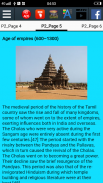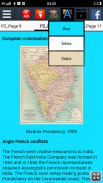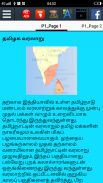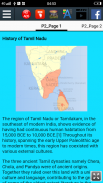










தமிழக வரலாறு - History of Tamil Nadu

Mô tả của தமிழக வரலாறு - History of Tamil Nadu
(English)
The region of Tamil Nadu or Tamilakam, in the southeast of modern India, shows evidence of having had continuous human habitation from 15,000 BCE to 10,000 BCE. Throughout its history, spanning the early Upper Paleolithic age to modern times, this region has coexisted with various external cultures.
The three ancient Tamil dynasties namely Chera, Chola, and Pandya were of ancient origins. Together they ruled over this land with a unique culture and language, contributing to the growth of some of the oldest extant literature in the world. These three dynasties were in constant struggle with each other vying for hegemony over the land. Invasion by the Kalabhras during the 3rd century disturbed the traditional order of the land, displacing the three ruling kingdoms. These occupiers were overthrown by the resurgence of the Pandyas and the Pallavas, who restored the traditional kingdoms. The Cholas~who re-emerged from obscurity in the 9th century by defeating the Pallavas and the Pandyas, rose to become a great power and extended their empire over the entire southern peninsula. At its height the Chola empire spanned almost 3,600,000 km² (1,389,968 sq mi) straddling the Bay of Bengal. The Chola navy held sway over the Sri Vijaya kingdom in Southeast Asia.
Rapid changes in the political situation of the rest of India occurred due to incursions of Muslim armies from the northwest and the decline of the three ancient dynasties during the 14th century, the Tamil country became part of the Vijayanagara Empire. Under this empire, the Kannada speaking Nayak governors ruled before the European trading companies appeared during the 17th century eventually assuming greater sway over the indigenous rulers of the land. The Madras Presidency, comprising most of southern India, was created in the 18th century and was ruled directly by the British. After the independence of India, after the Telugu and Malayalam parts of Madras state were separated from tamilakam state in 1956, it was renamed as Tamil Nadu in 1969 by the state government.
(தமிழ்)
தற்கால இந்தியாவில் உள்ள தமிழ்நாடு மண்டலம் வரலாற்றுக் காலத்துக்கு முன்பு முதல் மக்கள் வாழும் உறைவிடமாக தொடர்ந்து இருந்துவந்துள்ளது. தமிழ்நாட்டின் வரலாறும் தமிழ் மக்களின் நாகரீகமும் உலகின் மிகப் பழமையானவையாகும். முந்தைய பழங்கற்காலம் முதல் தற்காலம் வரையிலான தமிழ்நாட்டின் வரலாறு முழுவதிலும், இந்தப் பகுதியானது பல்வேறு புறக் கலாச்சாரங்களுடன் ஒருங்கிணைந்து இருந்து வந்துள்ளது. வரலாற்றில் ஒப்பீட்டளவில் குறுகிய காலப் பகுதிகளைத் தவிர்த்து, பிற காலகட்டங்களில் தமிழ்நாடு பகுதி புற ஆக்கிரமிப்புகள் எதுவுமின்றி சுதந்திரமாக இருந்து வந்துள்ளது.
சேர, சோழ, பாண்டிய மற்றும் பல்லவ பேரரசுகளே நான்கு பண்டைய பூர்வீக தமிழ் பேரரசுகளாக இருந்தன. இவர்கள் தனித்தன்மை வாய்ந்த கலாச்சாரம் மற்றும் மொழி ஆகியவற்றைக் கொண்டு இந்தப் பகுதியை ஆட்சி செய்தனர், இதனால் உலகில் அழியாமல் வழக்கத்திலிருந்த சில பழமையான இலக்கியங்களின் வளர்ச்சி சாத்தியமானது. இவர்கள் ரோமப் பேரரசுடன் அதிகப்படியான கடல்வழி வர்த்தகத் தொடர்புகளைக் கொண்டிருந்தனர். இப்பகுதியின் தலைமைக்காக இந்த மூன்று வம்சத்தைச் சேர்ந்தவர்களும் ஒருவருக்கொருவர் தொடர்ச்சியாக போரிட்டுக் கொண்டனர். மூன்று பேரரசுகளும் பாரம்பரியமாக ஆட்சி செய்துவந்த இந்தப் பகுதியை மூன்றாம் நூற்றாண்டில் நுழைந்த களப்பிரர்கள் விரட்டியதால் இப்பகுதியின் பாரம்பரிய ஆட்சி வடிவம் மாறியது. பாண்டியர்கள் மற்றும் பல்லவர்கள் மீட்டெழுந்து களப்பிரர் ஆதிக்கத்தை முறியடித்து தங்களின் பாரம்பரிய பேரரசுகளை மீண்டும் நிலைநாட்டினர். வீழ்ந்திருந்த சோழர்கள் ஒன்பதாம் நூற்றாண்டில் பல்லவர்களையும் பாண்டியர்களையும் தோற்கடித்து, தங்களது பெரும் சக்தியாக எழுச்சியடைந்து கிட்டத்தட்ட தெற்கு தீபகற்பப் பகுதி முழுவதும் தங்கள் பேரரசை விரிவுபடுத்தினர். வங்காள விரிகுடா பகுதியில் சோழப் பேரரசு சுமார் 3,600,000 கி.மீ2 அளவிற்குப் பரவி இருந்தது. தென்கிழக்கு ஆசியாவில் இருந்த ஸ்ரீ விஜயா பேரரசு பகுதியையும் சோழரின் கடற்படை கட்டுப்பாட்டில் கொண்டிருந்தது.





















